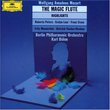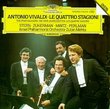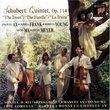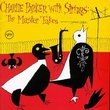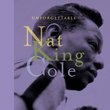| All Artists: Johann Sebastian Bach, Friedrich Gulda Title: Bach: The Well-Tempered Clavier, Book 1 Members Wishing: 1 Total Copies: 0 Label: Philips Release Date: 10/17/1995 Genre: Classical Styles: Forms & Genres, Improvisation, Historical Periods, Baroque (c.1600-1750), Modern, 20th, & 21st Century Number of Discs: 2 SwapaCD Credits: 2 UPC: 028944654523 |
Search - Johann Sebastian Bach, Friedrich Gulda :: Bach: The Well-Tempered Clavier, Book 1
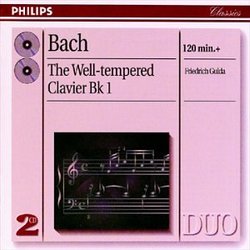 | Johann Sebastian Bach, Friedrich Gulda Bach: The Well-Tempered Clavier, Book 1 Genre: Classical
|
Larger Image |
CD DetailsSimilarly Requested CDs
|
CD ReviewsPostmodern Bach Dr. Christopher Coleman | HONG KONG | 02/04/2004 (3 out of 5 stars) "Every time a pianist plays Bach on a modern instrument, they make an interpretive choice--the Well-Tempered Clavier is NOT the Equal-Tempered Grand Piano. I'm not so much a purist to claim that such an interpretive choice is wrong, but I raise the issue to point out that interpretation is inevitable. So to condemn Gulda for playing in an ahistorical style is wrong. Gulda is extremely aggressive, approaching the music like a pugilist, hammering every note in some of the fugues, treating the individual note with single-minded intensity, always playing without pedal (historically correct, of course), unrelenting and not at all Romantic. In spite of this intensity and clear committment to a personal vision of the work, one can question the particular choices he makes, and I find myself doing so all too often. The C minor fugue, for example, is as dry and staccato as a sun-bleached bone. (The "thinness" other reviewers speak of is not, I think, a quality of Gulda's performance but of the instrument he uses, the room acoustic, and/or the engineering. ) Gulda's approach deemphasizes the sense of line most modern performers take, but allows him to think more structurally--he certainly shapes the fugues overall with varying levels of dynamic intensities. The 5 voice C# minor fugue comes off beautifully in this respect--I think it's his most engaging performance, and Gulda's intensity matches the dissonant quality of the work wonderfully. in fact, all of the C# pieces are excellent--perhaps it's Gulda's key! But the C minor fares less well. I find the dynamic swell at the end too great and too sudden--not quite a terraced dynamic that might have occured in Bach's instrumental music, but neither a carefully controlled crescendo. The effect seems more like a student who suddenly realises he's at the end and should have been playing louder, so saves what he can and overcompensates. Furthermore, in this particular fugue some of the countersubjects are lost due to Gulda's overemphasis on the subject proper. In the C major fugue, Gulda takes an extraordinarily slow tempo--I've never heard another performer take this tempo, or even anything near it. The consequence is that the stretto entries of the subject are quite easily recognized--not an easy thing in this fugue, with its constant stretti, but again, a feeling of longer line is lost. Generally Gulda's approach is an excellent one for clarity of counterpoint, but I find the overall aesthetic almost completely unattractive. Clearly Gulda knows the notes, has made thoughtful choices about how to play this music, but it's not an approach that I prefer. Of course you should decide for yourself, but listen to the clips Amazon provides before you order." A beautiful and precise well-tempered clavier Michael Newman | Long Beach, CA USA | 12/27/2004 (5 out of 5 stars) "I am the owner of many versions of the Well-Tempered Clavier, both volumes. Gulda's, which I have just recently discovered, is now one of my favorites, to me equaling Glenn Gould's and Rosalind Tureck's incredible performances. Gulda's, like Gould's, is eccentric and as dry as can be imagined; stacatto, minimal rubatto, no pedal -- often hard, sharp, even harsh. But what clarity; the lines of counterpoint stand out perfectly. Each interlocking melody is clearly and beatufilly defined. I'm not a big fan of "mushy" Bach playing (though some of it, like Andras Schiff's, is very fine indeed). Here is a nice, arid rendition of Bach's keyboard masterpiece. At a bargain price, how can you go wrong?" Zen Bach Revelation Fernand Raynaud | California, USA | 10/04/2007 (5 out of 5 stars) "It's all a matter of how many WTCs you can afford. I like them all. Not because I like everything, far from it, but because there have been some amazing performers out there over the years, making up for the fact that they don't improvise or create new music, creatively stretching Bach's paper, making it their battleground. If you thought Glenn Gould was eccentric, but (on reflection) maybe not quite eccentric enough, you should try this one.
It might be brutal to make this someone's first WTC, but this certainly is original, just when we thought we'd run out of ruses. It's a VERY clean recording. Very sparse. Completely to-the-point. Exquisite clarity, close-mic'ed, no silly room reverb, and the felt on the hammers was probably filed and needled before each session! They did a great job re-mastering this 1973 session. This sounds like a Steinway up close, laid into phat analog tape, with all the tape hiss gone. Luscious. You can hear every wave bouncing off the lid. Just when I thought rubato was the essence of consideration, here comes this approach, and it turns out rubato is a cheap trick. It's as if Gulda trimmed back most of the piano's sustain pedal, so it was harder to press, and decided to play sitting on a land-mine. This is to most other renditions as a Zen garden is to Chuck-e-Cheese. Glenn Gould sounds dreamy, in comparison. Gulda hits something on the head. Every note counts. Well, that's always true, but haven't you heard people WASTE notes? Most WTC performances are sort of "on the way to the next measure". But not Gulda's. It's like that thing he's sitting on is reminding him (and us) of our mortality, and of the importance of the moment. There IS something martial here as well. Indeed what makes it less than ideal for a beginner is how extreme it can be in all other dimensions while retaining those fixed tempos. Now and then he fires off maybe the fastest WTC selection ever heard, as if demonstrating the futility of trying to outrun it, though he sprints like the devil. Then he comes back into focus, and it's like watching the I.V. drip again. Some tempos are almost below the range of a metronome. But, you see, every drop matters. He is SO effective in bringing out inner voicings, that a few sudden changes in the overall volume are puzzling, and may be mastering artifacts. It's entirely unrobotic, even though the tempo is so rigid, because each note is placed with a meticulous micro-timing and dynamic that makes you think vertically, as much as some of the other great performances make you think thematically, or horizontally. It's not even a focus on harmony, it's the SPACE around the note, and how Bach set it up. I think it's brilliant, at times almost supra-human, like real AI. I've heard my fair share of WTCs. This one had me mesmerized on headphones; it sounds best that way. Heard at low volume, much of the subtlety is lost, and the occasional aggressiveness and dryness stand out. You will find that it will land on/in your player whenever things get too messy in your life. It's especially a great set to add if you already have a baroque or romantic one. And if you listen very very carefully you can hear him hum -- or maybe it's the music of the spheres joining in." |

 Track Listings (30) - Disc #1
Track Listings (30) - Disc #1